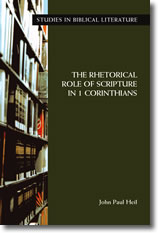
$38.00
John Paul Heil is Professor of New Testament at Kenrick-Glennon Seminary in St. Louis. His books include The Transfiguration of Jesus: Narrative Meaning and Function of Mark 9:2–8, Matt 17:1–8 and Luke 9:28–36 (Editrice Pontificio Istituto Biblico);
“Heil makes a significant contribution to the study of the use of the OT in the NT in his study of the role of scripture in 1 Corinthians. … This important work takes the scholar beyond the limited discussion of these texts found in commentaries and provides an in-depth study. The broad perspective of rhetorical criticism Heil employs gives him freedom to explore the many dimensions to Paul’s use of the OT. The rhetorical-critical perspective provides many insights into how and why the quotation in the specific form quoted and in the specific literary context contributes to Paul’s argument. This is rhetorical criticism at its best. While a specialized study and aimed at a scholarly audience, anyone will benefit from this astute and accessible study.”
— Dennis L. Stamps, Journal for the Study of the New Testament
